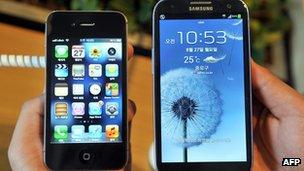Apple v Google: US judge dismisses patent lawsuit
- Published

Apple is involved in patent disputes with various rivals across the globe
A US judge has dismissed Apple's case in which it alleged that Google's Motorola unit was seeking excessive royalty payments for patents.
Motorola has sought 2.25% of the price of Apple products that use some of its patents, which Apple said was too high.
Last week, Motorola asked the court to set a price but Apple said it would not pay more than $1 (£0.60) per device.
Firms that own industry-essential patents are expected to offer them under fair licensing terms.
Motorola said it was still open to negotiations with Apple and was interested in reaching an agreement.
"Motorola has long offered licensing to our extensive patent portfolio at a reasonable and non-discriminatory rate in line with industry standards," the firm said in its statement.
'Subjectivity and assumption'
Google finalised its purchase of Motorola Mobility earlier this year for $12.5bn (£7.9bn).
The deal was Google's biggest acquisition ever and gave it access to more than 17,000 of Motorola's valuable patents.
While the firm is required to offer industry-essential patents at terms that are "fair, reasonable, and nondiscriminatory" or Frand for short, analysts said it was difficult to determine what a reasonable royalty was.
"It is very tough to determine what a fair price is of any patent held by a firm," Andrew Milroy of Frost & Sullivan told the BBC.
"There are complex financial models that are used to evaluate it - but there is a lot of subjectivity and assumption that goes into those.
"It can hardly be described as a science."
Meanwhile, some analysts said the dismissal of the case was a major setback for Apple as it was likely to give Motorola an upper hand in negotiations.
"This puts Apple back into the position it was before," said Lea Shaver, an intellectual property professor at Indiana University School of Law,
- Published20 September 2012
- Published14 September 2012